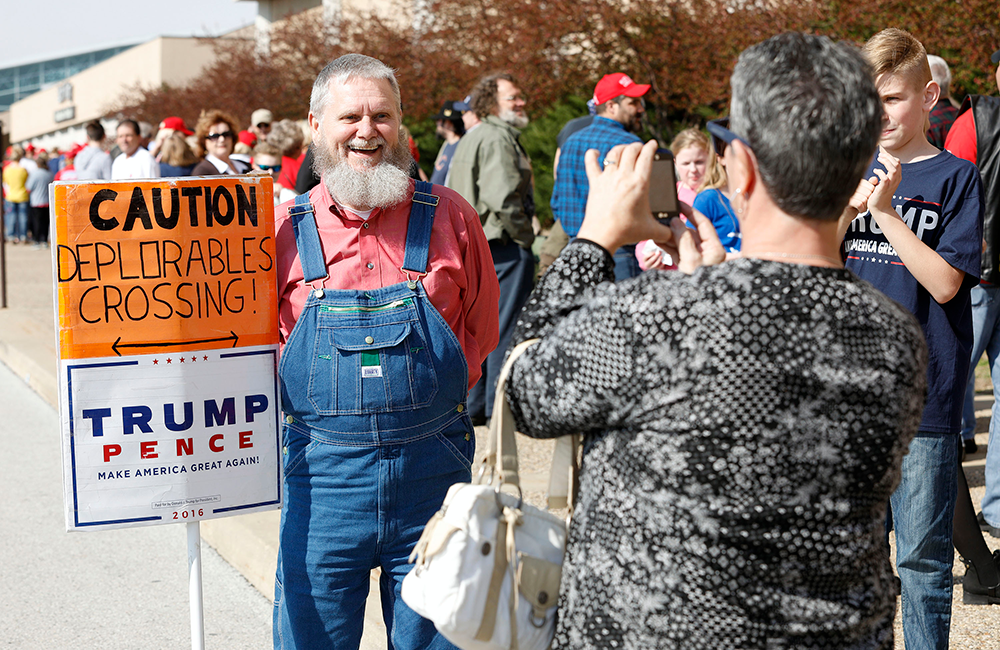If you have been to a football match in the past few years you will doubtless be familiar with what the Crown Prosecution Service defines as ‘tragedy-related abuse’. It is when supporters, David Peace writes,
sing, chant or gesture offensive messages about disasters or accidents involving players or fans – including references to the Hillsborough Disaster, Munich Air Crash, Bradford Fire, the Leeds fans killed in Istanbul or the death of Emiliano Sala in a plane crash.
The word ‘Munichs’, for example, is sometimes used as a term of abuse for Manchester United fans, and it’s not unknown for the opposition at Old Trafford to extend their arms, like little children pretending to be aeroplanes.
It is not unknown for the opposition at Old Trafford to extend their arms, like children pretending to be aeroplanes
The abuse directed at Manchester United is not funny or clever, for reasons I don’t need to explain. It can also lead to serious consequences. Earlier this year, an Everton supporter was sentenced to a six-month conditional discharge, ordered to pay a victim surcharge and prosecution costs, and issued with a three-year football banning order for making Munich-related ‘gestures’ at Man United fans. But just in case people are unclear about the source: on 6 February 1958, British European Airways Flight 609, carrying the Manchester United football team known as the Busby Babes, crashed at Munich-Riem Airport. Twenty-three people died at the scene or later from their injuries, including Manchester United players and staff, journalists and the plane’s co-pilot.
In Munichs, Peace seeks to reclaim the humanity of those involved in the tragedy – and the word ‘Munichs’ itself. In an afterword, he boldly puts up a challenge: ‘I would defy anyone to read this novel and then ever use “Munichs” as an insult again.’ He can defy all he likes – people, alas, will continue to be offensive. Nonetheless, his defiance is admirable and is matched by his skills as a writer: think Nobby Stiles meets George Best, on the page.
Peace is certainly well-qualified to retell the Munich story. He is originally from Yorkshire, and his books tend to be connected, with recurring characters and grand themes. First there was the ‘Red Riding’ quartet, about police corruption and the Yorkshire Ripper murders (Nineteen Seventy-Four, Nineteen Seventy-Seven, Nineteen Eighty and Nineteen Eighty-Three); then there was the Tokyo trilogy, about his adopted city (Tokyo Year Zero, Occupied City and Tokyo Redux). Unless he’s thinking of hitting a scorching curve ball and producing a fictionalised version of, say, the life and work of Bobby Robson, or ‘Alex Ferguson: The Musical’, Munichs surely now completes what we might call his managers’ hat-trick. The Damned Utd (2006) was his novel about Brian Clough’s brief spell as manager of Leeds United, while Red or Dead (2013) was his much longer fictional account of Bill Shankly’s reign at Liverpool.
Munichs is not dissimilar to the previous footballing books: tales of tough guys doing tough jobs, told in a tough prose which makes much use of repetition for dramatic effect. Not perhaps as audacious in style or ambition as Red or Dead, nor as controversial as The Damned Utd (which landed its publishers in all sorts of legal troubles for its blurry fact-meets-fiction portrayals), Munichs is nonetheless much more than a hi-falutin’ work of literary fiction about Matt Busby.
The real hero of the Munich disaster was, of course, Harry Gregg, the Man Utd goalkeeper, who survived the crash and pulled several of his teammates from the burning wreckage. Peace gives him his due in some bravura passages which detail his actions on the day, including saving Bobby Charlton and Danny Blanchflower. But the author’s genius is to allow multiple other characters to emerge from the shadows of the tragedy, giving voice in particular to the women involved, as when he recounts Busby visiting the widow of Geoff Bent, Man United’s left back:
It was only Marion who said what Matt knew all the other families of the dead must think, must surely want to say: why did you let them all get back on that plane again, after trying twice, failing twice, to take off? Why did not you or anyone else speak up? I mean, you are, you were, all grown men, you could call, speak up, but nobody said anything, I just can’t understand why.
Perhaps more than any other living British writer, and certainly with more determined invention, Peace clearly understands his role and responsibility as a serious chronicler of 20th-century social history. Munichs is unlikely to have much impact on those people who like to mock what happened in Munich, but it’s a fitting tribute to those who were there.






Comments